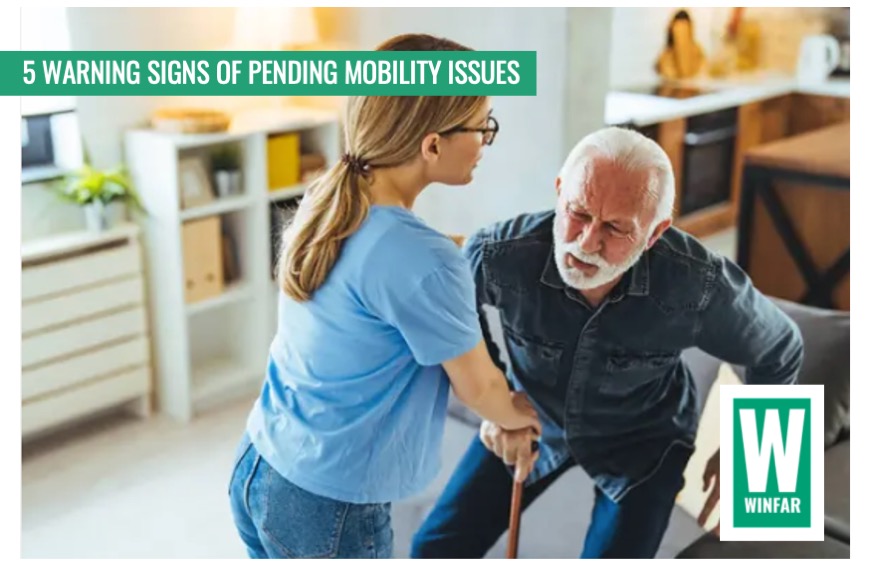Mobility is essential for senior independence. But many people don’t find out about their older adult’s developing mobility problems until it’s too late. To help you take pro-active action before an injury happens, here are 5 key warning signs of pending mobility issues.
Ensuring the well-being and independence of our older adults is a shared goal we all hold dear. Being aware and noticing these signs will help you take the necessary precautionary steps to improve your older adult’s balance and strength before something happens, helping them stay mobile and independent for as long as possible.
1. Falls:
While some older adults may be resilient and seem unfazed by occasional falls, these incidents could be indicative of underlying mobility concerns. Even two falls in a year warrants attention.
So even if your older adult hasn’t been seriously injured (yet), fall-proofing their home with grab bars, handrails on stairs, non-slip tub mats, etc. is highly recommended.
It’s also important to ask their doctor to evaluate their mobility.
The doctor can check for health conditions that could be causing problems, look for negative medication side effects, or recommend physical therapy to build balance and strength.
2. Avoiding the Stairs:
If you notice your older adult opting for elevators or spending more time downstairs to avoid stairs, it might be an indication of challenges in strength and balance.
Engage in an open conversation about their concerns. And when ready, discuss the option of mobility aids. Even something as simple as a cane, can be pivotal in addressing any fears or physical difficulties they may be experiencing.
3. Difficulty with Sitting and Standing:
The seemingly simple act of sitting and standing can be telling. If your older adult struggles with these movements, it may be a sign of potential mobility issues.
If you are concerned, conduct a simple sit-to-stand exercise together. This simple test can offer valuable insights into any support they might need. Thereafter, you can make an informed decision.
It’s crucial to discuss these observations with their doctor to explore potential causes and solutions.
4. Balance Issues
Dizziness and having trouble with balance can be caused by a variety of factors including medication side effects, low blood pressure, or inner ear issues like vertigo or Meniere’s disease.
In addition, issues associated with normal aging like impaired vision, joint stiffness, slower reaction times, and muscle weakness reduce the body’s ability to stay balanced. They can make walking, standing, and exercising difficult.
To improve mobility, your older adult’s doctor can test their balance and treat underlying problems.
Mobility aids like canes or walkers and targeted exercises can help an older adult with balance issues and allow them to get around more safely and confidently.
5. Avoiding Exercise
Encouraging regular exercise is essential, even if it’s not their favorite activity. Persistent fatigue or a gradual decline in energy levels could signal impending mobility issues. Addressing these symptoms early on can prevent a decline in their ability to walk or stand comfortably.
Approaching these warning signs with empathy and understanding is crucial. Engage in open conversations with your older adult, listen to their concerns, and involve healthcare professionals to ensure a holistic approach to their well-being. Together, we can empower our seniors to maintain their mobility and independence for as long as possible.

